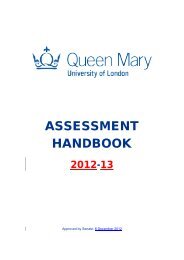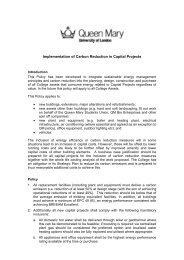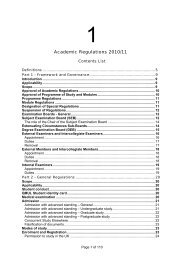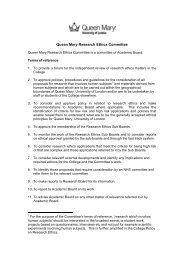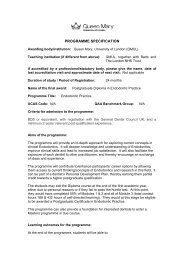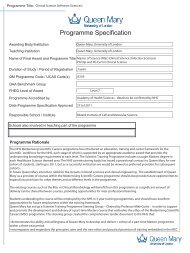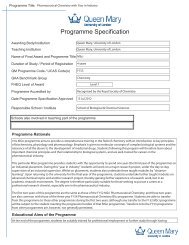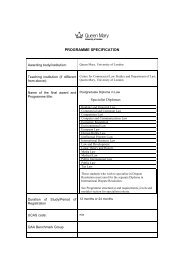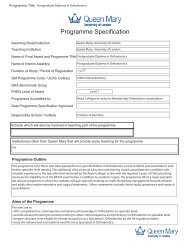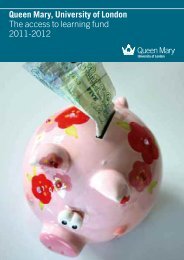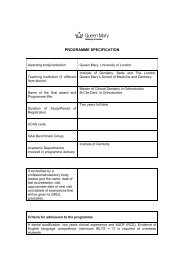Paper - Academic Registry and Council Secretariat - Queen Mary ...
Paper - Academic Registry and Council Secretariat - Queen Mary ...
Paper - Academic Registry and Council Secretariat - Queen Mary ...
Create successful ePaper yourself
Turn your PDF publications into a flip-book with our unique Google optimized e-Paper software.
Taught Programmes Board<br />
TPB2012-015<br />
6) External Adviser Comments<br />
Detailed comments from at least one external adviser - submissions must be supported by external specialist<br />
opinion, e.g. from a representative of a professional organisation, or a senior academic in another institution.<br />
The external adviser should be able to comment in sufficient detail on the appropriateness <strong>and</strong> viability of the<br />
proposed programme (s). For further guidance regarding the selection criteria, role <strong>and</strong> expectations of<br />
External Advisers please refer to the External Adviser Guidelines.<br />
I am satisfied that the programme set out in the documentation fulfills all the main criteria for a degree course of this st<strong>and</strong>ard<br />
<strong>and</strong> has the necessary combination of rigour <strong>and</strong> relevance to meet the needs of the target group of students envisaged. My<br />
comments below are, therefore, concerned with detail <strong>and</strong> emphasis in the content of the main modules of the programme.<br />
First, the policy <strong>and</strong> governance module sets a clear direction. It starts from the premise that public policy <strong>and</strong> institutions of<br />
governance are always intertwined. Public administration is not just the instrumental processes of carrying out policies. There is<br />
a realistic emphasis on the way that institutions shape the formulation of policies <strong>and</strong> <strong>and</strong> determine set limits to what is<br />
feasible. The scope of the programme, as reflected in the recommended literature, encompasses the range of contingencies<br />
<strong>and</strong> constraints that public managers face <strong>and</strong> the means at their disposal to achieve results. While reference is made to the fact<br />
that the context of public management is international <strong>and</strong> not just national, I think that more should be made of this. The<br />
target group of students is international <strong>and</strong> their future career opportunities <strong>and</strong> working environments are also international.<br />
This module should be framed <strong>and</strong> taught within a robust comparative framework so far as empirical materials <strong>and</strong> basic<br />
concepts are concerned.<br />
The organisational behaviour module is well designed to give students a realistic picture of the variety of organisations<br />
involved in the management of public policies. Beginning from common sense categories such as not-for-profit <strong>and</strong> voluntary<br />
organisations it points the way to more systematic analysis of relevant typologies that are of real practical value. An additional<br />
comment is worth making. That is the importance in public management of the interorganisational dimension. Public policies<br />
are managed through organisational networks. The theme of joined up government is an important one, whether as welldesigned<br />
coordination systems at the national <strong>and</strong> subnational levels or as integration at the European <strong>and</strong> international levels.<br />
I have a question whether this part of the course sufficiently covers the management of the budgetary process. I know there is a<br />
separate, optional, financial management module but in times of austerity the budgetary <strong>and</strong> financial system is putting public<br />
organisations <strong>and</strong> public managers under severe stress - up to <strong>and</strong> including fiscal crisis levels. This needs to be recognised in<br />
case study work (<strong>and</strong> perhaps that is already envisaged).<br />
The leadership <strong>and</strong> strategy module is basically sound. Starting from an analysis of different leadership responsibilities, roles<br />
<strong>and</strong> styles it covers the main facets of operational <strong>and</strong> strategic leadership together with attention to the vital interface<br />
between political <strong>and</strong> managerial processes. This approach avoids the common pitfall of simplistic read-across from business<br />
management. There is now sufficient literature to support this <strong>and</strong> avoid getting bogged down in byways of the debates about<br />
the "new public management". One possible change of emphasis in this module might be greater consideration of the<br />
institutional design component of leadership <strong>and</strong> strategy. With so many areas of public management facing the prospect of<br />
reform if they are not already in process, skills in designing new organisations <strong>and</strong> bringing designs to fruition are at a premium.<br />
Developing expertise in this would enhance the career prospects of students. The institutional design theme would dovetail<br />
with the work on accountability frameworks covered elsewhere in the curriculum. Following the logic of the course I feel that<br />
concepts <strong>and</strong> cases focussing on management of change should be given more prominence than appears to be the case. (This<br />
may be just my reading of the programme.) My reason for making the point is that implementation is the Achilles Heel of<br />
reforms. Politicians seemed to have a trained incapacity to give it the priority it warrants. A programme like this should try to<br />
correct this mistake.<br />
The public finance <strong>and</strong> accounting module is an option in this programme. As mentioned above I think that in the current "Age<br />
of Austerity" there could be an important link with the organisational behaviour module. In the first place resource constraints<br />
are changing the politics of the budgetary process <strong>and</strong> generating pressures for better performance. The budgetary context is<br />
forcing the pace of change in ways that require innovation not just cuts. In addition students need to underst<strong>and</strong> the ways that<br />
accounting conventions <strong>and</strong> practices can legitimate, <strong>and</strong> even encourage, ineffective or counterproductive organisational<br />
performance.<br />
Finally, a comment made particularly with the expected profile of the student intake in mind. I think that both in substance <strong>and</strong><br />
from a marketing point of view the programme would benefit from giving prominence to public management issues at the<br />
international level; European <strong>and</strong> global; where the deficiencies of existing organisations have become obvious <strong>and</strong> the future<br />
trajectory of European integration <strong>and</strong> economic globalisation have become more problematical. At these levels reform is on



